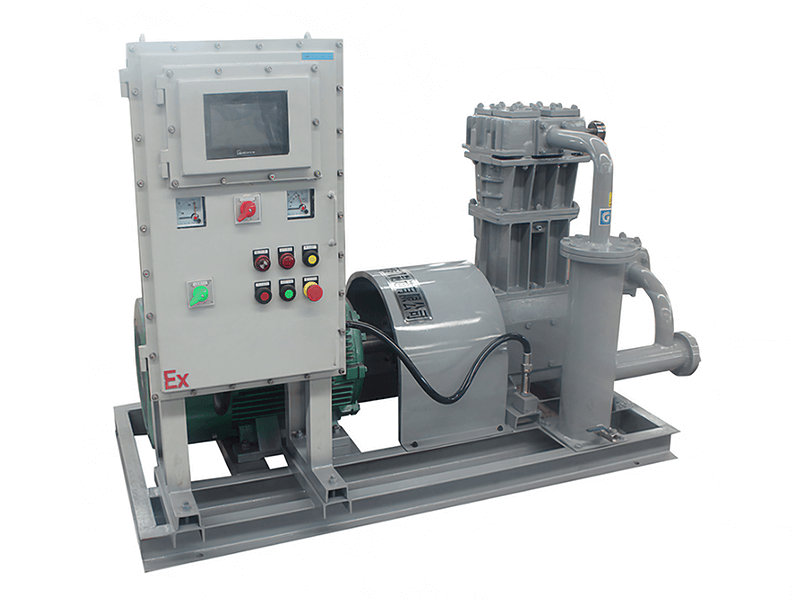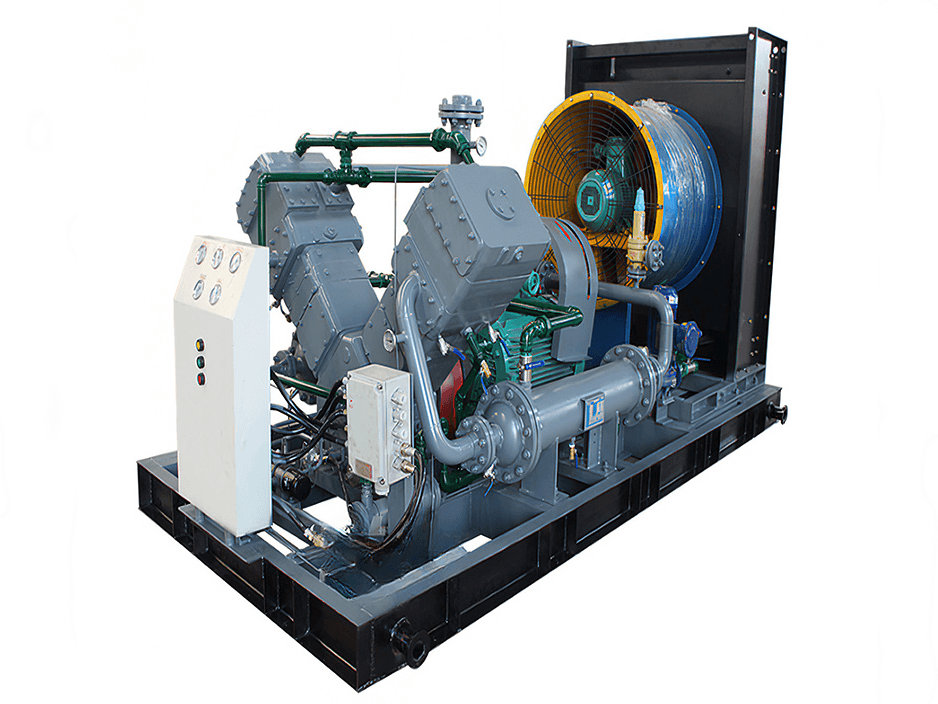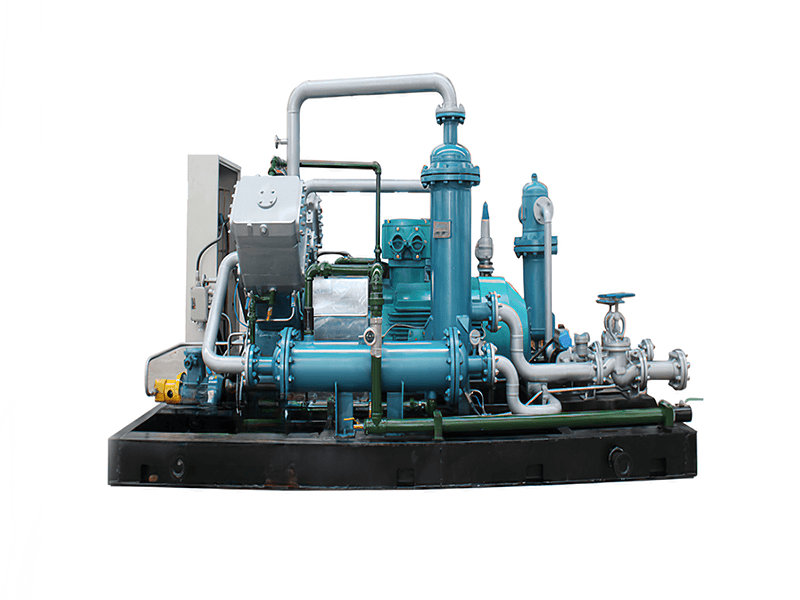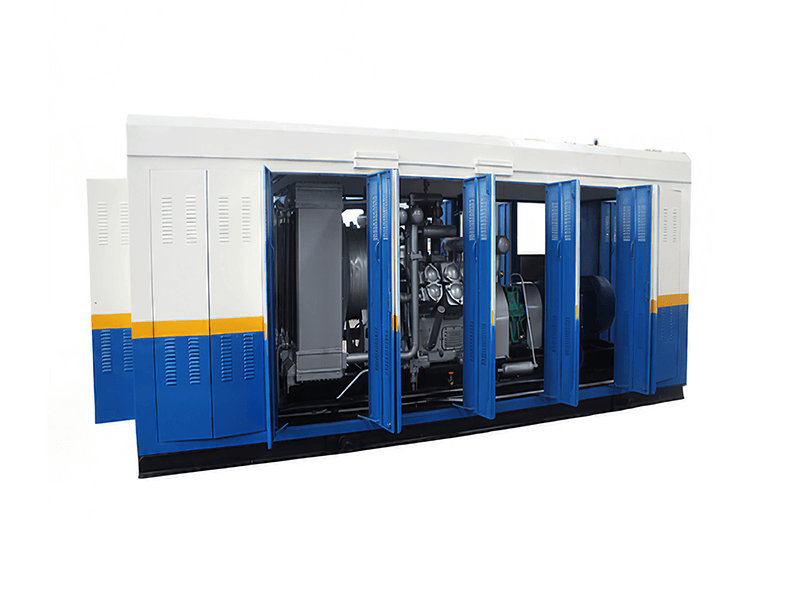The piston gas compressor is widely used in industries such as petrochemicals and is a very common industrial gas compressor. It can handle a wide range of gases, such as nitrogen, hydrogen, carbon monoxide, natural gas, and various mixed gases. Similarly, piston gas compressors can be classified into natural gas compressors, nitrogen compressors, hydrogen compressors, and so on depending on the target audience. It operates based on the principle of reciprocating motion, where one or more pistons move back and forth within a cylinder to compress the gas.
How a piston gas compressor works:
Cylinder and Piston Arrangement: A piston gas compressor typically consists of one or more cylinders with a piston inside each cylinder. The number of cylinders can vary based on the compressor's capacity and requirements.
Intake Stroke: During the intake stroke, the piston moves away from the cylinder head, creating a partial vacuum within the cylinder. This causes the inlet valve to open, allowing the gas to enter the cylinder from the suction line.
Compression Stroke: Once the intake stroke is complete, the piston starts moving towards the cylinder head, compressing the gas trapped in the cylinder. As the piston moves upward, the pressure of the gas increases, and the temperature rises.
Discharge Stroke: At the end of the compression stroke, the discharge valve opens, allowing the compressed gas to exit the cylinder and enter the discharge line. The gas is then directed to the desired destination, such as a storage vessel or further processing.
Exhaust Stroke: After the discharge stroke, the piston moves back towards the cylinder head, pushing out any remaining gas from the cylinder through the exhaust valve. This prepares the cylinder for the next intake stroke.
Piston gas compressors are known for their versatility and ability to handle a wide range of gas compositions and pressures. They are commonly used in various applications, including casing gas compression in the oil and gas industry, industrial processes, refrigeration systems, and more.
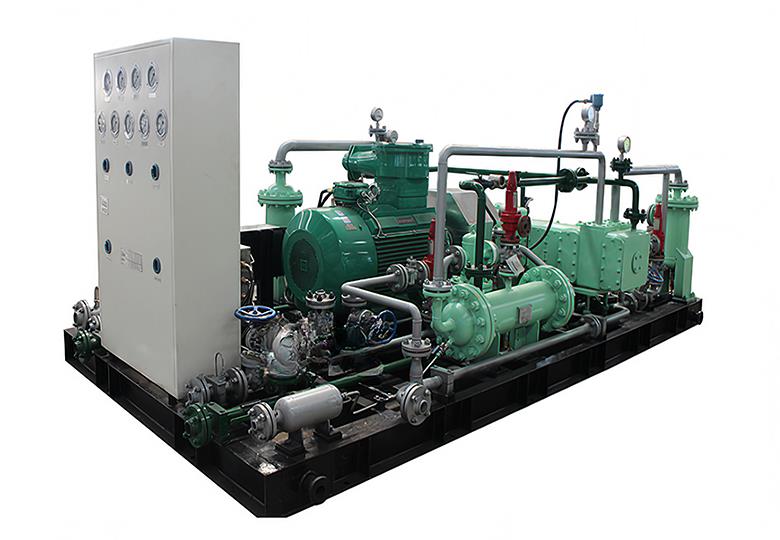
Benefits of piston gas compressors:
Wide Operating Range: Piston compressors can handle a broad range of gas pressures and flow rates, making them suitable for different applications.
Compact Design: These compressors can be designed in a compact form, allowing for space-efficient installations.
Cost-Effectiveness: Piston compressors often have a lower initial cost compared to other types of compressors, making them a cost-effective choice for certain applications.
Customizable: Piston compressors can be customized to meet specific requirements, including different cylinder configurations, power options, and control systems.
However, piston gas compressors can have higher maintenance requirements, and they may generate more noise and vibration compared to other compressor types. Regular maintenance and monitoring are necessary to ensure their optimal performance and longevity.
Comparison with other gas compressors
When comparing piston gas compressors with other types of gas compressors, such as rotary screw compressors and centrifugal compressors, several factors come into play. Here are some key points of comparison:
Compression Mechanism:
Piston Compressors: Piston compressors use reciprocating pistons to compress gas. The gas is drawn into the cylinder during the intake stroke and compressed as the piston moves towards the cylinder head.
Rotary Screw Compressors: Rotary screw compressors utilize two interlocking helical screws to compress gas. As the screws rotate, the gas is trapped and progressively compressed along the screw profiles.
Centrifugal Compressors: Centrifugal compressors employ high-speed rotating impellers to accelerate the gas and convert kinetic energy into pressure energy.
Capacity and Pressure Range:
Piston Compressors: They are suitable for a wide range of capacities, from small to large, and can handle moderate to high-pressure applications.
Rotary Screw Compressors: These compressors are often used for medium to large capacity applications and can handle moderate to high pressures.
Centrifugal Compressors: Centrifugal compressors are typically used for large capacity applications and are well-suited for high-pressure operations.
Efficiency:
Piston Compressors: They can achieve high compression efficiencies, especially in smaller capacity ranges. However, efficiency may decrease at higher pressures.
Rotary Screw Compressors: Rotary screw compressors offer good efficiency across a wide range of operating conditions.
Centrifugal Compressors: Centrifugal compressors are known for their high efficiency, particularly in large capacity applications.
Size and Footprint:
Piston Compressors: They tend to have a more compact design and require less space compared to rotary screw and centrifugal compressors.
Rotary Screw Compressors: Rotary screw compressors are relatively compact but require more space than piston compressors.
Centrifugal Compressors: Centrifugal compressors are typically larger and require more space due to their complex design and higher capacity requirements.
Noise and Vibration:
Piston Compressors: They can generate higher levels of noise and vibration compared to rotary screw and centrifugal compressors.
Rotary Screw Compressors: These compressors generally produce lower noise and vibration levels compared to piston compressors.
Centrifugal Compressors: Centrifugal compressors tend to operate at lower noise and vibration levels, especially in larger capacity ranges.
Maintenance and Service:
Piston Compressors: They have relatively higher maintenance requirements due to the reciprocating mechanism, including regular inspection of valves, piston rings, and lubrication systems.
Rotary Screw Compressors: These compressors have fewer service requirements and longer maintenance intervals compared to piston compressors.
Centrifugal Compressors: Centrifugal compressors require specialized maintenance due to their complex design and high speeds.
Cost:
Piston Compressors: They often have a lower initial cost compared to rotary screw and centrifugal compressors, making them more cost-effective for certain applications.
Rotary Screw Compressors: Rotary screw compressors generally have higher initial costs but offer good efficiency and reliability.
Centrifugal Compressors: Centrifugal compressors are typically the most expensive option due to their complex design and high capacity capabilities.
Ultimately, the choice of compressor type depends on specific application requirements, including capacity, pressure range, efficiency, space availability, noise considerations, and budget constraints. It's essential to evaluate these factors and consult with experts to select the most suitable compressor for your specific needs.
Applications of piston compressors
Piston compressors, or reciprocating compressors, are widely used in various applications due to their versatility and ability to handle different gas compositions and pressures. Here are some common examples of applications where piston compressors are commonly used:
Industrial Manufacturing: Piston compressors are often utilized in industrial manufacturing processes for applications such as pneumatic tools, air-operated machinery, and control systems. They provide compressed air for powering equipment and actuating components.
Oil and Gas Industry: In the oil and gas sector, piston compressors find application in various areas, including casing gas compression, wellhead compression, gas lift operations, and gas transmission. They are used to compress natural gas, associated gas, and other gases encountered during drilling and production processes.
Refrigeration and HVAC: Piston compressors play a vital role in refrigeration and HVAC (Heating, Ventilation, and Air Conditioning) systems. They compress refrigerant gases to create cooling effects, enabling air conditioning, refrigeration, and chilling in residential, commercial, and industrial settings.
Gas Stations and Fueling: Piston compressors are commonly employed in gas station air compressors used for filling tires and providing compressed air services. They ensure proper tire inflation and assist in maintaining optimal vehicle performance and safety.
Food and Beverage Industry: Within the food and beverage industry, piston compressors are utilized in various processes such as bottling, canning, dairy production, and food packaging. They provide compressed air for pneumatic conveying, food processing, and control systems.
Power Generation: Piston compressors are employed in power generation applications, especially in smaller-scale power plants or backup power systems. They assist in gas compression for engines, turbines, and power generation equipment.
Laboratory and Medical Applications: Piston compressors are used in laboratory settings for applications like air supply to analytical instruments, gas chromatography, and sample processing. They are also utilized in medical facilities for tasks such as air compression for respiratory equipment and pneumatic systems.
These are just a few examples, and piston compressors find use in many other industries and applications where compressed gas is required. Their versatility, wide range of capacities, and ability to handle a variety of gases make them a popular choice in numerous sectors.















